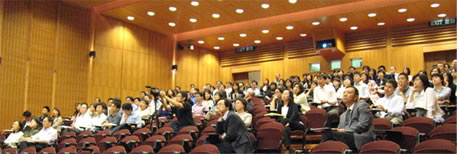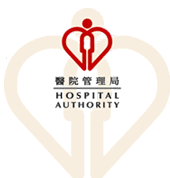 |
 |
 |
| |
 |
| |
|
| |
 n his column in last year's October/November issue our Chief Executive, Mr Shane Solomon, mentioned that the HA planned to introduce "Pay for Performance" (P4P), a new way to allocate resources. Since then, Mr Solomon and the Head Office Casemix Office have conducted more than 20 forums and workshops to explain the system to more than 3,000 of our colleagues in the Clusters and the Head Office. n his column in last year's October/November issue our Chief Executive, Mr Shane Solomon, mentioned that the HA planned to introduce "Pay for Performance" (P4P), a new way to allocate resources. Since then, Mr Solomon and the Head Office Casemix Office have conducted more than 20 forums and workshops to explain the system to more than 3,000 of our colleagues in the Clusters and the Head Office.
The P4P system has now been operating for three months. We have interviewed Dr Sharon Chan, Associate Consultant (Surgery) of United Christian Hospital, and Dr CK Chan, Deputy Hospital Chief Executive (Clinical Services) and Consultant (Medicine) of Queen Mary Hospital, to hear what front-line colleagues think about it.

|
 |

"I need to double-check the discharge summaries of patients to ensure that diagnosis and procedure codes are correct. The idea of introducing the new funding system is good, as resources shall be allocated more fairly. However, the system does have some drawbacks. For instance, it fails to reflect accurately the resources that each case needs. Take mastectomies as an example. Those involving reconstruction and those which don't require very different manpower and resources, yet their procedure codes under the new system are the same. Moreover, the new funding system emphasises too much on the workload. It may not help enhance the quality or efficacy of services, e.g introduction of day surgery or day centre, and that may affect the modernisation of clinical services."
|
|

"The Hong Kong West Cluster's budget was cut by $22 million after the P4P system was implemented. We have therefore set up a performance office to promulgate the new system and to help our front-line colleagues to ensure that the diagnosis and procedures codes they handle are always accurate and reflect the truth. At present, the office is studying our own costs. We are also working out a method to analyse our spending for better performance. In fact, many of our staff members don't understand why the budget was cut, how the $22-million figure was arrived at, and which departments will be affected. What we do know is that our Cluster wants to do better next year; but we haven't figured out how to do it."

"We passed on the two doctors' comments to Dr KH Lee, Chief Manager (Financial Planning). While Dr Lee admits that no system can be perfect, he believes the allocation of resources will become more transparent and fair as P4P evolves, and that it will contribute to improving the quality of our services. "Appropriate documentation will help to make the casemix fairer. It will enhance our clinical care, too. We are encouraging our front-line colleagues to be active in exploring ways to improve the existing workflow, so that we can take advantage of the opportunities that casemix presents."

Your comments will help our colleagues to refine the system further. Dr Lee encourages you to give him any opinions or suggestions that you may have about P4P via your Cluster's representative (please see table below) or by email (casemix@ho.ha.org.hk) . You may also contact your representative or write to this email address if you would like to learn more about the new system. 
| Cluster representatives |
| Hong Kong East Cluster |
Dr CC Lau, HKEC CSD(CS)1 / HKEC CSC(A&E) / PYN DHCE / PYNAED COS |
| Hong Kong West Cluster |
Dr CK Chan, QMH Deputy HCE(Clinical Services) / QMH CONS(MED) |
| Kowloon East Cluster |
Dr Tak Yi Chui, KEC SD(OMCS)/HHH HCE |
| Kowloon Central Cluster |
Dr Johnny Chan, QEH CON(MED) |
| Kowloon West Cluster |
Dr Joseph Lui, KWC CCC(RM), PMH DHCE & CMC/OLMH/PMH/YCH COS(ANE) |
| New Territories East Cluster |
Dr Chi Bon Leung, NTEC SD(CI&MR)/PWHMED Cons(MED) |
| New Territories West Cluster |
Dr CK Ho, NTWC SD(CS) / TMH Deputy HCE / COS(OPH) |
|
|
|
|

